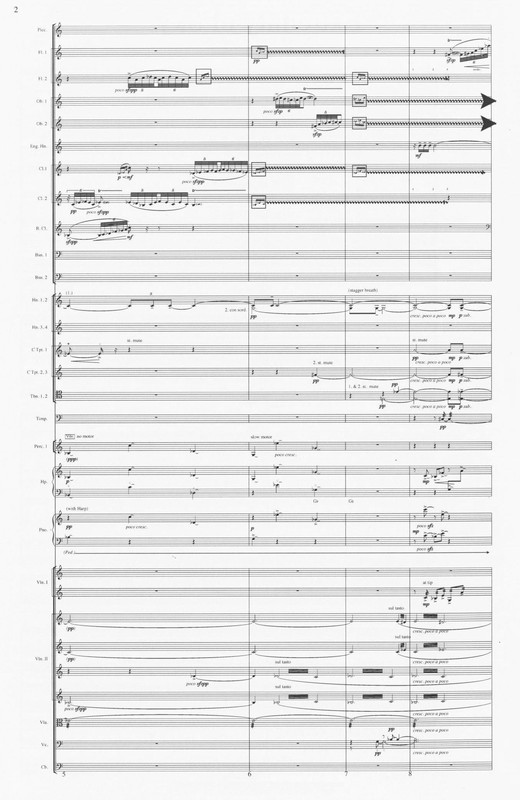Extremity of Sky: Concerto for Piano and Orchestra
Item
-
Score title
-
Extremity of Sky: Concerto for Piano and Orchestra
-
Composer
-
Melinda Wagner
-
Program note
-
Before she devoted herself fully to her creative work, Ms. Wagner had been active as a pianist; she expressed herself as being especially happy with the commission for the present work because she had always wanted to compose a piano concerto, in which the solo part would be equal to the orchestra's. What she had shown little interest in doing was writing descriptive or "programmatic" music--but Extremity of Sky, and its very title, came to incorporate a certain level of acknowledgement of an event that changed many lives and set off a number of direct, overt responses in music and verse. Phillip Huscher, in his annotation for the work's Chicago premiere, wrote that
"Wagner was immersed in work on the second movement of the concerto when the events of September 11, 2001, disrupted her composing routine as well as daily life in her New Jersey community, a commuter's drive from New York City--from a high ridge in their town, Wagner and her family [her husband the percussionist James Saporito and their two children] could see the smoke rising above Manhattan. Later that autumn, when she ran across the phrase "extremity of the skies" ([in] Act III of King Lear), she realized that it might serve as a title for the work, not because it described the nature of the music itself, but because of the way Shakespeare's image captured the unimaginable atmosphere that year while she was writing the concerto."
The work as a whole, however, was not reshaped as a response to or image of that day's violence or of the atmosphere left in its wake. As noted, Ms. Wagner had outlined the work's structure and was already working on the second movement at that time, and did not revise her overall design to reshape the concerto as an expression of outrage or lamentation. She has in fact stated that she
"had to work very hard at not thinking about the enormity of that tragedy while writing (a sure path to writer's block for me). I did not feel capable of expressing such a present and raw thing through such an abstract language. I was also very aware of the privacy of those who were suffering direct loss. I did trust, though, that what was happening in the world, and the intensity of my feelings about that, would somehow come out in the music."
As the work evolved, only one of the four movements came to have any direct relationship to a consequence of the tragic events of September 11 that did touch the composer personally, and it is not specifically indicated in the score, though each movement bears a title indicating its function or general nature:
OPENING, described by the composer in a note of her own for the premiere as being "in large part gestural, serving as an introduction--a kind of anacrusis--to the following movement."
DEPARTURE, "more thematic and developmental."
PRAYER-CHAIN, an adagio that serves as "a kind of collective prayer." Sections of this movement carry such markings as "with aching tenderness" and "more and more intense"; at the movement's end is the inscription, "In memoriam Michael Carroll, Firefighter, September 11, 2001." Michael Carroll, one of Ms. Wagner's New Jersey neighbors, was a member of the New York Fire Department who lost his life attempting to rescue people trapped in the Twin Towers. The composer points out that her "In memoriam" is more in the nature of a personal acknowledgement than a public gesture: in her own words, "My dedication had to do with the fact that my friend, and all of the others, were ever-present in my mind at that time." Once the powerful intensity is spent, the "Prayer-chain" ends with a section headed "Olivia's Music (a little girl's slightly out-of-tune music box)," which Ms. Wagner advises "was written with my daughter Olivia and her friend Olivia Carroll in mind."
VARIED RETURN: "Composing a ‘return' proved to be a most interesting and challenging process. One cannot simply tack on previously heard music; it has to be made to work dramatically and to convey some sense of acquired maturity, and at the same time, closure" The opening of this final movement is headed "Playful," and in the middle part there is a passage marked "Very blustery and self-important." There is abundant vitality, there is humor, and the end is quiet but warm-hearted and confidently affirmative.
 Melinda Wagner
Melinda Wagner

